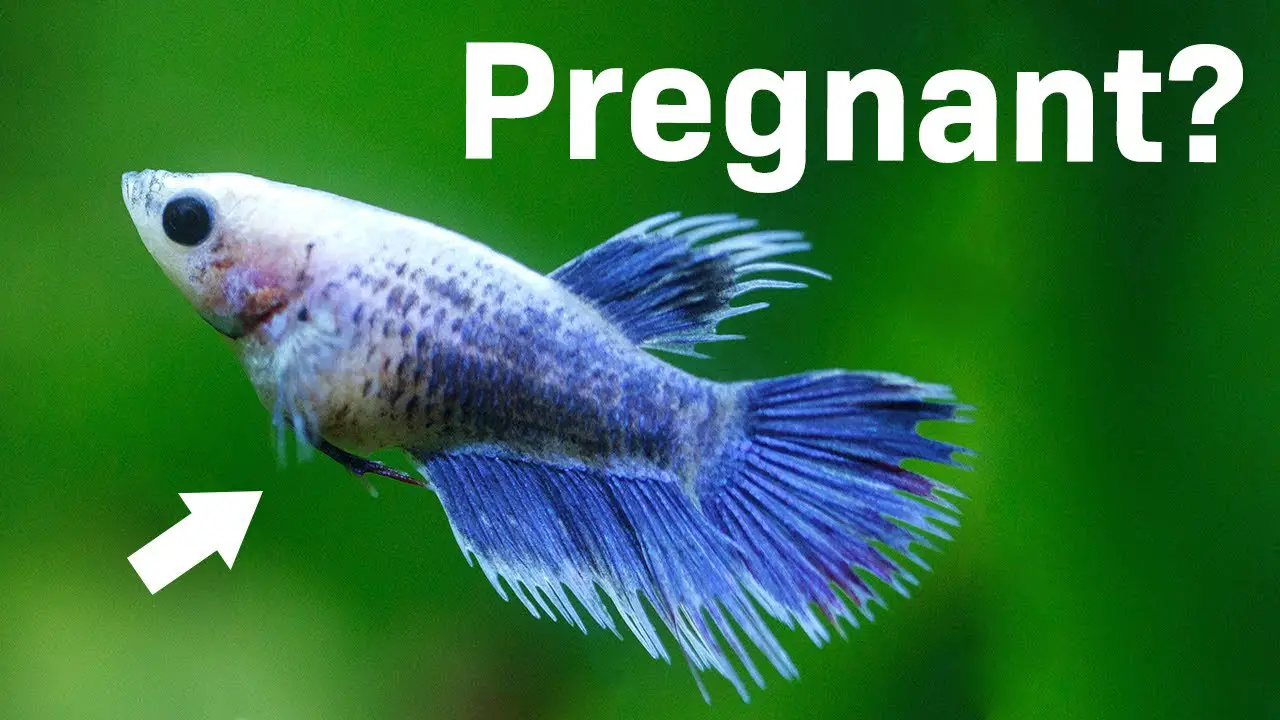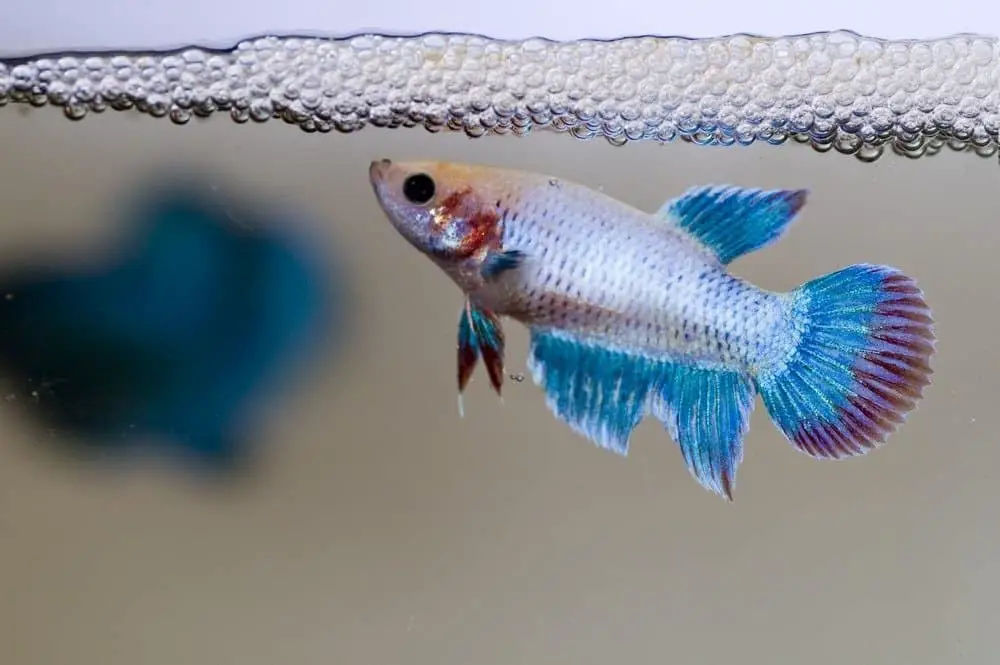Originally posted on May 22, 2023 @ 7:00 pm
Last Updated on 2 days by admin
Betta fish, also known as Siamese fighting fish, are popular pets among fish enthusiasts. These beautiful and colorful fish can be found in various shades and patterns, making them a fascinating addition to any aquarium. However, many people are curious about their reproduction process, particularly how long they are pregnant for.
So, how long are betta fish pregnant? Unlike mammals, fish do not carry their young inside their bodies for a long period. Instead, betta fish lay eggs, and the female betta fish can carry the eggs for a few days before laying them. The entire process, from egg fertilization to hatching, typically takes around two to three days, making the pregnancy period for betta fish relatively short.
Betta fish are not technically pregnant as they are egg-layers. The female betta fish carries the eggs in her body after mating with the male betta fish. The eggs hatch within 24 to 36 hours, and the fry will become free-swimming after three days. The entire process takes about four to six days in total.

How Long Are Betta Fish Pregnant?
Betta fish, also known as Siamese fighting fish, are popular pets due to their vibrant colors and beautiful fins. If you have a female betta fish, you may be wondering how long their pregnancy lasts. In this article, we will discuss the length of a betta fish pregnancy and what you can expect during this time.
Understanding Betta Fish Reproduction
Before discussing the duration of a betta fish pregnancy, it is essential to understand their reproduction process. Betta fish reproduce through external fertilization, where the male releases sperm, and the female picks it up to fertilize her eggs. Once the eggs are fertilized, they are laid in a bubble nest built by the male.
The Mating Process
When betta fish are ready to mate, the male will start building a bubble nest at the surface of the water. He will then try to entice the female to the nest by flaring his fins and displaying his vibrant colors. If the female is interested, she will approach the male, and they will start circling each other.
Once the female is ready, she will release her eggs, and the male will fertilize them. The male will then collect the eggs in his mouth and transfer them to the bubble nest.
The Pregnancy Duration
After the eggs are transferred to the bubble nest, the male will guard them and ensure they stay in the nest. The eggs will hatch in two to three days, and the newborn betta fish, known as fry, will stay in the bubble nest for an additional two to three days until they are strong enough to swim on their own.
The duration of a betta fish pregnancy, from the moment the eggs are fertilized until they hatch, is approximately three to five days.
Caring for Pregnant Betta Fish
If you have a pregnant betta fish, it is essential to provide them with the proper care to ensure the health of both the mother and fry.
Feeding
During pregnancy, female betta fish require a nutrient-rich and protein-heavy diet to support the growth of their eggs. It is recommended to feed them high-quality betta pellets, live or frozen brine shrimp, or bloodworms.
Tank Conditions
It is crucial to maintain the proper tank conditions during a betta fish pregnancy. The water should be kept clean, and the temperature should be between 76-82°F. It is also recommended to have a hiding place for the female to rest and recover after laying her eggs.
Male Separation
After the eggs are laid, it is recommended to separate the male from the female and eggs to prevent him from eating the eggs or fry. The fry should be left in the bubble nest until they are strong enough to swim on their own.
Benefits of Breeding Betta Fish
Breeding betta fish can be a rewarding experience for pet owners. It allows you to observe the unique and fascinating reproduction process of these beautiful fish. Additionally, breeding betta fish can lead to healthier and stronger offspring.
Vs Buying Fish
Breeding your betta fish is also a cost-effective alternative to buying fish from a pet store. It allows you to control the quality and lineage of your fish, ensuring that they are healthy and free of any genetic disorders.
Cautions
However, breeding betta fish should not be taken lightly. It requires knowledge and preparation to provide the proper care for both the mother and fry. Additionally, breeding betta fish can lead to overpopulation and the need for additional tanks and resources.
Conclusion
In conclusion, the duration of a betta fish pregnancy is approximately three to five days. During this time, it is essential to provide the proper care for the mother and fry to ensure their health and well-being. Breeding betta fish can be a rewarding experience, but it should be approached with caution and care.
Frequently Asked Questions
Betta fish are a popular species of freshwater fish that are often kept as pets. As with any pet, it is important to understand their reproductive biology and life cycle. One common question that many people have is how long are betta fish pregnant? Here are some frequently asked questions and answers about betta fish pregnancy.
How long are betta fish pregnant?
Betta fish are not technically pregnant in the same way that mammals are. Rather than carrying eggs internally and giving birth to live young, female bettas lay eggs and the male fertilizes them externally. Once the eggs have been laid and fertilized, the female’s role in the reproductive process is over.
So, while betta fish are not pregnant, it can take several days for the eggs to hatch and for the fry (baby fish) to become free-swimming. Depending on the water temperature and other environmental factors, this process can take anywhere from two to four days.
How do you know if a betta fish is male or female?
It can be difficult to tell the difference between male and female betta fish, especially in young fish that have not yet developed their distinctive fins and coloring. One way to determine the sex of your betta is to look at their fins. Male bettas typically have longer, more flowing fins than females. They also tend to be more colorful and have more vibrant patterns.
Another way to tell the difference is to observe their behavior. Male bettas are typically more aggressive and territorial than females. They may flare their fins and gills when they feel threatened or when they are trying to attract a mate. Female bettas, on the other hand, tend to be more docile and may even be housed together in groups.
How often do betta fish lay eggs?
Female bettas can lay eggs every two to three weeks in the right conditions. However, it is important to note that not all bettas will breed successfully or produce viable eggs. Breeding betta fish requires careful attention to water quality, temperature, and other environmental factors.
If you are interested in breeding bettas, it is important to do your research and learn as much as you can about their reproductive biology and care requirements. This will help you ensure the health and well-being of your fish and their offspring.
How many eggs do betta fish lay?
The number of eggs that a female betta will lay will vary depending on a number of factors, including her age, size, and health, as well as the conditions in which she is kept. On average, female bettas will lay anywhere from 10 to 50 eggs per spawn.
It is important to note that not all of these eggs will be viable or hatch successfully. Many factors can impact the health and viability of betta eggs, including water quality, temperature, and genetics. Breeders who are looking to produce high-quality offspring will often cull (remove) eggs that are not developing properly or that show signs of genetic defects.
How do you care for betta fry?
Caring for betta fry can be a challenging and time-consuming process. Once the eggs have hatched and the fry are free-swimming, they will need to be fed a diet of infusoria (tiny aquatic organisms) or liquid fry food. As they grow, their diet will need to be adjusted to include larger food items, such as brine shrimp or crushed flakes.
Betta fry are very small and delicate, so it is important to keep their environment clean and well-maintained. They should be housed in a separate tank with gentle filtration and a heater to maintain a consistent water temperature. Breeders will often use a variety of techniques to keep the fry healthy and prevent overcrowding, including daily water changes and separating the fry into different tanks as they grow.

Can a betta fish get pregnant? (Betta Fish Pregnant WITHOUT a male betta?)
To wrap up, betta fish pregnancy is a fascinating and important topic for any fish enthusiast. Although the length of pregnancy can vary, it typically lasts between 10 and 30 days. During this time, it’s crucial to ensure that the female betta fish is well-fed and housed in a comfortable environment to increase the chances of a successful pregnancy.
While it may seem like a short period, betta fish pregnancy is a critical time for the survival of the species. It’s essential to know the signs of a pregnant betta fish and how to care for her during this time. With proper care, your beloved betta fish can bring new life into your aquarium and continue to thrive for years to come.
In conclusion, understanding the length of betta fish pregnancy and how to care for a pregnant fish is crucial for any responsible fish owner. By providing the right environment and nutrition, you can help ensure a successful pregnancy and the birth of healthy new betta fish fry.
